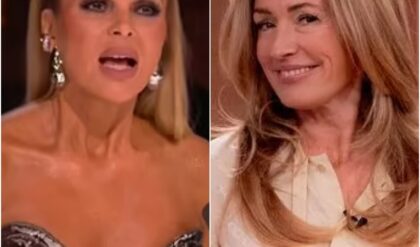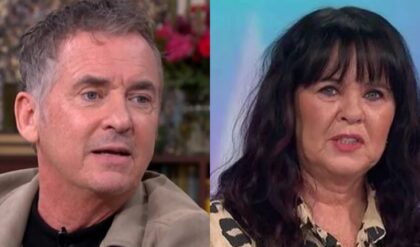King Charles shocked the public with his “confession” about Princess Diana’s de@th, leaving Prince William completely stunned
At the age of 75, King Charles has made an unexpected and deeply personal confession that has sent shockwaves throughout the public, particularly among those

who have long followed the tumultuous history of his relationship with the late Princess Diana. In a candid and heartfelt acknowledgment, the monarch has finally admitted to the mistakes
and misjudgments he made during his marriage to Diana, asking for forgiveness in a rare moment of vulnerability. His words, “I was deeply mistaken; please forgive me, Princess Diana, for my mistakes,”
mark a striking departure from the guarded, often stoic persona that Charles has maintained throughout his life, and they offer a glimpse into a man who, despite his position of power, has come to terms with the weight of his past actions.

This confession comes at a time when King Charles has spent decades in the public eye, often scrutinized for his relationship with Diana and his subsequent marriage to Camilla Parker Bowles,

the woman he had a long affair with during his marriage. For years, the royal family has been the subject of intense media speculation and public interest,

with Charles often cast as the villain in the tragic love story between him and Diana. While the public has long been aware of the strained and ultimately doomed marriage, the acknowledgment of his faults from the man at the heart of it all is something that many thought would never come. King Charles’s public admission of guilt and his plea for forgiveness is significant not only for its personal implications but also for its broader historical context. The marriage between Charles and Diana was one of the most highly scrutinized and publicized unions in modern history. Their fairy-tale wedding in 1981 was watched by millions, but the reality of their relationship quickly became evident as they faced mounting pressures, including infidelities, incompatibilities, and a growing public divide. Diana’s eventual divorce from Charles in 1996 and her tragic death a year later only served to deepen the public’s fascination with their relationship, leaving many to wonder about the truth behind the royal façade.
For King Charles, this new revelation is a long-overdue moment of introspection. While his reign as monarch has been marked by a sense of duty and responsibility, this public acknowledgment of his mistakes represents a rare moment of emotional vulnerability. It has taken him decades to reach this point, and the timing of his confession speaks volumes about the personal toll that his actions have had on him. In his statement, Charles expressed deep regret over the way he treated Diana during their marriage and the mistakes he made that contributed to the breakdown of their relationship.

“I was deeply mistaken,” Charles admitted, his voice laden with regret. “I was too focused on my own desires and not enough on the needs of the woman I was married to. I hurt her in ways that I can never fully atone for, and for that, I ask for her forgiveness—though I know it may be impossible to fully make up for the pain I caused.” These words are powerful and resonate deeply with those who have followed the story of Diana’s life and death. The Princess of Wales was beloved by millions for her compassion, her dedication to charity, and her vulnerability in the face of her personal struggles. Her marriage to Charles was plagued by infidelities and misunderstandings, leaving her emotionally isolated and deeply unhappy for much of their time together.
Despite the years that have passed since Diana’s death, the scars of their marriage still linger in the public consciousness. For many, Diana’s tragic end marked the final chapter in a long and painful saga, one that was fraught with emotional wounds that never fully healed. Charles’s admission of his mistakes is not just an apology to Diana herself but also a recognition of the broader emotional impact that their failed marriage had on their sons, William and Harry, and on the public’s perception of the royal family.
Though King Charles’s statement may be seen by some as a moment of personal growth and reflection, it is also a reminder of the public nature of his mistakes. As the heir to the British throne, Charles’s actions were always under the microscope, and his relationship with Diana was no exception. The public’s fascination with the royal couple was immense, and every aspect of their marriage, from their disagreements to their divorce, was scrutinized by the media. Now, as the reigning monarch, Charles must confront the legacy of those years, not just as a private individual but as the leader of a nation and the symbol of an institution.

The timing of this confession is also noteworthy in the context of King Charles’s current reign. Having ascended the throne after the death of his mother, Queen Elizabeth II, Charles now holds the highest office in the United Kingdom. His acknowledgment of past mistakes may be seen as an attempt to reconcile his personal history with his new role as king. It signals a shift in his approach to leadership—one that emphasizes personal accountability and an understanding of the human side of royal duties.
Moreover, King Charles’s public plea for forgiveness opens up a broader conversation about forgiveness itself. Can Diana’s memory and the royal family move beyond the mistakes of the past? Will the public, who have long been divided over the story of Diana and Charles, be able to accept this new version of the prince-turned-king, one who recognizes his flaws and expresses genuine remorse for his past actions? These are questions that only time will answer.
Ultimately, King Charles’s admission serves as a reminder that even those in positions of great power are not immune to the weight of their actions. It is an acknowledgment that personal growth, healing, and forgiveness are difficult, complex processes—especially when they are played out on the world stage. Diana’s legacy continues to live on in the hearts of millions, and now, King Charles’s public apology adds another layer to the complicated and often painful narrative of their relationship. Whether this moment of reflection will help heal old wounds, both within the royal family and among the public, remains to be seen.
News
Jake Paul SH0CKING Boxing World with First-Round Knockout of Mike Tyson, Secures $300 Million and Cements His Status as a Top Contender.K
Jake Paul Shocks Boxing World with First-Round Knockout of Mike Tyson, Secures $300 Million and Cements His Status as a Top Contender In an astonishing turn of events that left boxing fans and experts alike reeling, Jake Paul, the…
Jake Paul breaks silence on critics: “Mike Tyson Has No Chance To Bully Me” ahead of rescheduled fight.K
Jake Paul breaks silence on critics: “Mike Tyson can’t bully me” ahead of rescheduled November fight In a highly anticipated rematch set for November, Jake Paul is preparing for his rescheduled fight against boxing legend Mike Tyson. Known for his…
B0MBSHELL: Mike Tyson Turns On ‘Killer Mode’, Annoys Jake Paul With A Series Of Cold Responses Ahead Of Netflix Blockbuster Fight!
Mike Tyson ‘in kill mode’ as boxing icon frustrates Jake Paul with frosty one-word answers ahead of Netflix mega-fight Iron Mike did let out a quick glimpse of his volatile prime MIKE TYSON frustrated even Jake Paul with his frosty…
SH0CK: Jake Paul Hits Record Weight For Fight With Mike Tyson, While 58-Year-Old Legend Stunned With Toned Body And Versace Pants!K
Jake Paul weighs career-HEAVIEST for Mike Tyson fight as boxing legend, 58, shows off shredded physique in Versace pants The two had to be pulled apart on stage JAKE PAUL hit a career-HEAVIEST weight for his fight against the…
“WOW! AMAZING KO” Mike Tyson was stunned by Jake Paul in the fourth round of a private fight. Tyson took more than 15 seconds to recover before landing a devastating knockout blow that ended it all.K
“WOW! AMAZING KO” Mike Tyson was stunned by Jake Paul in the fourth round of a private fight. Tyson took more than 15 seconds to recover before landing a devastating knockout blow that ended it all. In an unprecedented and…
“Romantic Drama” Jake Paul’s X-R@TED response After Catching NFL Player Texting His Ex-Girlfriend Privately! SH0CKING message content.K
Jake Paul’s X-rated response after catching NFL player sliding into his ex-girlfriend’s DMs Some eagle-eyed viewers believe they have worked out who he’s referring to. A video of Jake Paul reacting to an NFL star sliding into his girlfriend’s DMs…
End of content
No more pages to load











